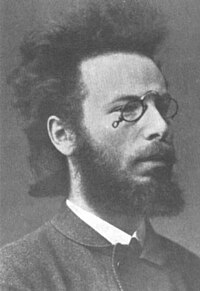Frederick Eckstein
You can help expand this article with text translated from the corresponding article in German. (December 2009) Click [show] for important translation instructions.
|
For the German philologist and educator, see Friedrich August Eckstein

Frederick Eckstein (February 17, 1861 in Perchtoldsdorf, Lower Austria – November 10, 1939 in Vienna) was an Austrian polymath, theosophist and a friend and temporary co-worker of Sigmund Freud.
Also the husband of fellow theosophist and writer Bertha Diener, Eckstein's penchant for occultism first became evident as a member of a vegetarian group which discussed the doctrines of Pythagoras and the Neo-Platonists in Vienna at the end of the 1870s. His esoteric interests later extended to German and Spanish mysticism, the legends surrounding the Templars and the freemasons, Wagnerian mythology and oriental religions. In 1886, in the week after the tragedy at Mayerling, in which Crown Prince Rudolf of Austria, and his mistress were found dead in mysterious circumstances, he and his friend, the composer Anton Bruckner (for whom he also served as private secretary) traveled to the monastery of Stift Heiligenkreuz to ask the abbot there for details of what happened.[1]
Eckstein's book on Anton Bruckner was published in 1923.[2]
References
- ^ Goodrick-Clarke, Nicholas (1992). The Occult Roots of Nazism: Secret Aryan Cults and Their Influence on Nazi Ideology. New York: NYU Press. ISBN 0-8147-3054-X.
- ^ Erinnerungen an Anton Bruckner by Friedrich Eckstein, 1923, republished by Severus, 2013 ISBN 3863474961
